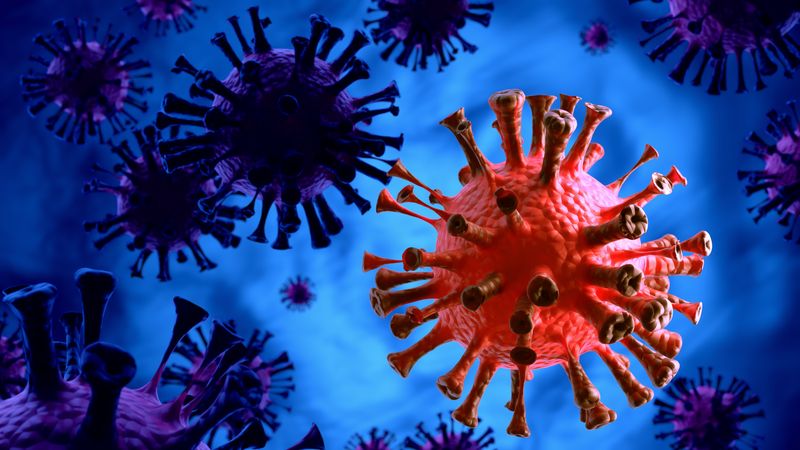In a troubling turn of events, the US Centers for Disease Control and Prevention (CDC) has released alarming statistics, indicating that the JN.1 subvariant of the coronavirus is now responsible for approximately 20% of new Covid-19 infections in the United States. This revelation comes as JN.1 solidifies its status as the fastest-growing strain of the virus, with a particularly dominant presence in the Northeast, where it accounts for around one-third of all new infections.
JN.1’s origin traces back to BA.2.86, also known as Pirola, a subvariant that gained global attention during the summer due to a significant overhaul of its spike proteins—more than 30 changes, to be exact. Initial fears circled around the possibility that BA.2.86 might be so heavily mutated that it could entirely evade the protection offered by vaccines and antibodies against Covid-19, potentially triggering a wave of illness akin to the devastating impact of the original Omicron variant in 2021. However, this catastrophic scenario did not unfold as anticipated. Instead, BA.2.86 persisted, albeit at a slow pace in some countries, including the United States, with studies suggesting that it might have lost some of its ability to infect human cells.
Enter JN.1, a subvariant that stands two generations removed from BA.2.86, likened to a granddaughter in the virus’s evolutionary lineage. Despite having only one change to its spike protein compared to its predecessor, JN.1 has proven to be a more formidable and rapidly spreading virus.
Recent estimates from the CDC reveal that the prevalence of JN.1 more than doubled in the US between late November and mid-December. This surge is suspected to be exacerbated by holiday travel and the phenomenon of waning immunity among the population.
Dr. Shishi Luo, who heads infectious diseases for the genomic sequencing company Helix, emphasizes the sharp rise in JN.1’s growth curve, coinciding with the Thanksgiving break. Variant trackers now predict that JN.1 will soon become the leading coronavirus variant globally, overtaking existing strains in a matter of weeks. The World Health Organization (WHO) has classified it as a variant of interest due to its “rapidly increasing spread,” although the additional public health risk remains currently low.
Dr. T. Ryan Gregory, an evolutionary biologist at the University of Guelph in Ontario, warns that JN.1 appears highly competitive with existing XBB variants and is on track to become the next globally dominant group of variants.
The mutation in JN.1’s spike protein, positioned in a way that seemingly aids the virus in evading our immunity, is a cause for concern. Studies conducted by researchers at Columbia University and in China suggest a twofold decrease in the ability of antibodies to neutralize this subvariant. While not a drastic drop, it raises the specter of another wave of infections on the horizon.
The situation is echoed in several European countries, including Denmark, Spain, Belgium, France, and the Netherlands, where JN.1 is experiencing exponential growth, leading to a surge in hospitalizations. Similar trends are emerging in Australia, Asia, and Canada.
In the United States, the combination of waning immunity and a relatively low proportion of the population receiving the latest Covid-19 vaccine poses a significant challenge. As of December 9, only about 18% of adults have received the latest vaccine, mirroring the low proportion from the previous year. The CDC urgently calls on doctors to intensify efforts to vaccinate their patients, emphasizing that it is not too late in the season to benefit from the shots.
However, amidst the concerning surge, a recent study from Dr. David Ho’s lab at Columbia University brings a glimmer of hope. The current Covid-19 vaccine, designed to enhance the body’s ability to combat XBB family variants, also offers substantial protection against BA.2.86 and its offshoots, including JN.1. The WHO has issued a statement supporting the upgraded Covid-19 vaccines against XBB.1.5, recognizing their broad protection against a variety of variants.
Despite these positive findings, Dr. Alex Greninger, assistant director of the Clinical Virology Laboratory at the University of Washington, expresses dismay over a decline in booster and antiviral usage. He stresses the importance of utilizing available tools to combat the evolving threat of Covid-19, especially considering the extensive efforts made to develop and distribute vaccines and antiviral drugs.
As the world grapples with the surge of JN.1 and its potential ramifications, the emphasis on vaccination, booster shots, and continued public health measures remains critical in mitigating the impact of this latest twist in the ongoing battle against the pandemic.



